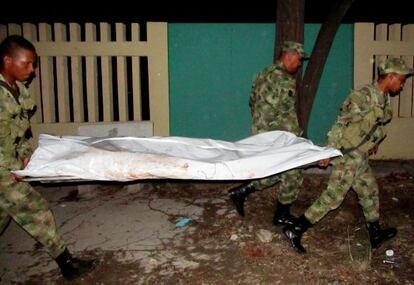FARC commando unit massacres a dozen soldiers in surprise ambush
Former Colombian president was apparent objective of bomb in Buenos Aires

A commando unit of the Revolutionary Armed Forces of Colombia (FARC) massacred 12 soldiers in a rural area near the Venezuelan border on Monday, according to Colombian authorities.
Survivors of the attack said that between 100 and 120 guerrillas ambushed the men in a rural area near Maicao municipality, La Guajira department, in north Colombia, where a group of about 30 soldiers was guarding workers installing electricity towers, which had previously been knocked down by the FARC.
After a gun battle, 10 soldiers and two officers were left dead.
Colombian Defense Minister Juan Carlos Pinzón identified the FARC unit as the 59th Front, saying its members crossed the border from Venezuela.
"What we know is that this FARC unit crossed over from Venezuela to attack our soldiers and later poured back into the neighboring country," he said.
President Juan Manuel Santos said he spoke with Venezuelan President Hugo Chávez, who assured him he would "not permit the presence of any illegal groups, of any sort, in my country."
It was a small device but contained enough explosives to kill people"
"Some guerrilla units may have passed over to Venezuelan territory," Chávez said in a news conference in Caracas. "We are strengthening patrols and security in the area."
For years, Colombian officials, especially members of the previous administration of Álvaro Uribe, have long accused Chávez of harboring FARC rebels. The charges grew so tense during the Uribe government - including allegations that Chávez was supplying the rebels with weapons he had purchased from Sweden - that relations soured and bilateral trade was frozen in July 2009. Both countries withdrew their own ambassadors from Caracas and Bogota for a short period.
This latest attack brings the total number of Colombian soldiers killed in FARC ambushes this year to 37.
The attack occurred just one week after a man disguised as a street vendor attached a bomb to a vehicle carrying former Interior Minister Fernando Londoño in Bogota. Londoño was slightly injured in the assassination attempt but two of his bodyguards were instantly killed. Around 30 other people were also injured.
Andrés Villamizar, director of the country's National Protection Unit, described the bomb as a type frequently associated with the Basque terrorist group ETA, which has been linked to the FARC in the past.
In an interview with Miami Herald columnist Andrés Oppenheimer, Uribe blamed Venezuela for the attack and said "Chávez's dictatorship in Venezuela is an accomplice to the FARC."
On Tuesday, police in Buenos Aires said someone planted a bomb at a theater where the former Colombian leader was scheduled to make an appearance. The device was set to go off at 4.30pm when Uribe and a lot of other people were to be on hand. Police immediately detonated it after they discovered it.
"It was a small device but it contained enough explosives to kill people," said Federal Judge Norberto Oyarbide, who is investigating the case.
It wasn't immediately clear how the bomb was discovered at the Rex Theater. One version of the incident maintains that an anonymous caller tipped off police.
Several leftist organizations in Argentina had planned a march in Buenos Aires to protest Uribe's visit.
Both Uribe and Londoño have been critical of what they see as Santos' soft stance on the FARC.
"This war continues and will continue until we reach our goal to establish peace in this nation," Santos said Monday.
Tu suscripción se está usando en otro dispositivo
¿Quieres añadir otro usuario a tu suscripción?
Si continúas leyendo en este dispositivo, no se podrá leer en el otro.
FlechaTu suscripción se está usando en otro dispositivo y solo puedes acceder a EL PAÍS desde un dispositivo a la vez.
Si quieres compartir tu cuenta, cambia tu suscripción a la modalidad Premium, así podrás añadir otro usuario. Cada uno accederá con su propia cuenta de email, lo que os permitirá personalizar vuestra experiencia en EL PAÍS.
¿Tienes una suscripción de empresa? Accede aquí para contratar más cuentas.
En el caso de no saber quién está usando tu cuenta, te recomendamos cambiar tu contraseña aquí.
Si decides continuar compartiendo tu cuenta, este mensaje se mostrará en tu dispositivo y en el de la otra persona que está usando tu cuenta de forma indefinida, afectando a tu experiencia de lectura. Puedes consultar aquí los términos y condiciones de la suscripción digital.








































